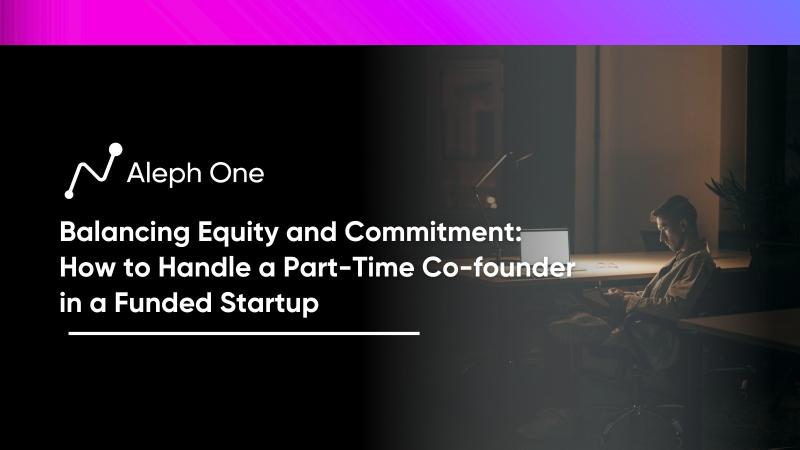Let’s work together to build something amazing. Share your project details and our team will reply to figure out the next steps to your success.

In the startup world, hearing about equal equity splits among co-founders is common. However, this approach doesn’t work for part-time co-founders.
This article explores the reasons why equal equity rarely works for part-time co-founders and offers a data-driven approach for determining a fair equity amount. As well as three key factors that co-founders should consider when determining equity splits: time spent on the startup, unique value added to the business, and the economic opportunity cost.
By using this approach, co-founders can avoid conflicts and resentment and ensure that the equity split reflects each member’s value and commitment to the company.

The Challenges of Part-Time Co-founders: Why Equal Equity Rarely Works
Part-time co-founders who work for equity face significant challenges in startups. Studies show that, on average, part-time co-founders own 20-30% less equity in startups than their full-time counterparts. There are a few reasons why equal equity splits rarely work for part-time co-founders:
4 Reasons Why 50/50 Equity Split Rarely Works for Part-Time Co-Founders
1) Time commitment
Startups require an immense time commitment to be successful, often 60-80 hours a week or more. Part-time co-founders simply can’t match the time their full-time counterparts put in, which means they contribute less value overall. Their equity should reflect this reality.
2) Opportunity cost
Full-time co-founders are sacrificing salary and career opportunities to focus on the startup. Part-time co-founders still have their primary jobs and careers, so they are making a different level of sacrifice. Their equity should account for their lower opportunity cost.
3) Value added
In addition to their time and effort, full-time co-founders can build more relationships, get more done, and drive more progress. This means that they add more value to the fledgling company. Part-time co-founders won’t add as much value in a limited time commitment, which would justify them receiving less equity.
4) Replaceability
It’s hard to replace someone who makes a startup their sole focus and priority. They know the ins and outs of the business and become the go-to source for information. On the other hand, part-time co-founders can only focus as much as their other responsibilities allow, making them more replaceable.
While part-time co-founders deserve equity for their contributions, equal equity splits are difficult to justify for the above reasons. Startups need to determine the equity in a data-driven way based on each co-founder’s value, time, opportunity cost, and replaceability. Otherwise, resentment and conflict can emerge. They are balancing equity and commitment for the good of the startup.
How Much Equity Should a Part-Time Co-Founder Get? A Data-Driven Approach
Determining how much equity a part-time co-founder should receive is critical. Establishing expectations from the beginning is best to avoid confusion and miscommunication as much as possible. The equity split should reflect the value the co-founder adds to the company while being realistic about their limited time commitment. A data-driven approach based on three key factors can help establish a fair equity amount.
3 Key Factors to Consider When Determining an Equity Split
1) Time Spent on the Startup
Part-time co-founders typically commit between 10 to 30 hours per week. Those on the higher end of that range, 20-30 hours, would merit more equity, around 10-20% for a 2-3 person team. Those with a lighter, 10-hour-per-week commitment may receive closer to 5-10%. The time they can commit is a direct measure of their value added.
2) Unique Value Added to the Business
Consider the co-founder’s skills, experience, network, and other assets that substantially improve the company’s chances of success. For example, a co-founder who is a technical expert bringing key IP or engineering skills could receive 10-15% equity. Someone with little relevant experience or value added would merit closer to the minimum, around 5%.
3) Economic cost
Part-time co-founders are often employed elsewhere, so consider the income and benefits they are forgoing to cofound the company. Higher opportunity cost merits higher equity, e.g., 15-20% for a co-founder leaving a $200K/year job vs. 10% equity for someone with a $50K side job.
A co-founder with skills, experience, and value-added that would be very difficult to replace likely deserves more equity, e.g., 15-20% for a technical expert vs. 10% for a co-founder in a more general role. The more vital and irreplaceable the co-founder, the higher their equity should be.
Using these factors as a guide, most part-time co-founders receive 10-20% equity, on average around 15% for a typical three-person startup team. But each situation is unique, so analyze the details and be transparent about determining what is fair based on the value each co-founder adds. The equity split should incentivize your co-founders to commit for the long haul while also being realistic about their limited time. Achieving this balance is crucial to startup success.
Why Vesting is Non-Negotiable for Part-Time Co-founders
For part-time co-founders, vesting is essential to balancing equity and commitment. Vesting means that equity is earned over time through continued contributions to the company. Rather than receiving all equity upfront, part-time co-founders vest or earn their equity over a period of several years.
Without vesting, there is a risk that a part-time co-founder can walk away with a large equity stake after making only a limited contribution. This is unfair to the other co-founders and not in the company’s best interests. Vesting helps ensure that equity is earned through sustained commitment over the long run.
Most startup investors will require that all co-founders, including part-time ones, have their equity subject to vesting. The typical vesting period is 3 to 4 years. For example, a part-time co-founder may be granted 20% equity with 25% vesting after one year, then 75% vesting over the following 36 months. If they leave before the total vesting period, they forfeit the unvested portion of equity.
The exact vesting terms are negotiated between co-founders and any investors. For part-time co-founders, a longer initial vesting period, e.g., 2-3 years until the first portion vests, and a more extended overall vesting period of 4 years is reasonable. The vesting schedule should be clearly outlined in a legal agreement between co-founders.
Overall, vesting should be non-negotiable. It helps ensure equity is earned, not given and aligns incentives for the company’s long-term success. With the right vesting terms in place, startups can benefit from the contributions of part-time co-founders without putting equity at risk.
How to Prevent Resentment and Conflict with Equity Splits
Unequal equity splits can breed resentment, lack of motivation, and conflict—especially when things get complicated. As a startup, you already face immense challenges; unequal equity split is an issue that can be catastrophic. Addressing these risks upfront is critical through open communication, transparency, and aligning your vision and values.
Open communication is vital. Discuss each co-founder’s expectations, priorities, and concerns before determining equity. Continue these honest conversations as the startup progresses to ensure everyone feels heard and supported. Part-time co-founders may feel less connected to the day-to-day, so make an effort to communicate over and loop them in.
Transparency around equity, time commitments, and responsibilities is important. Document each co-founder’s equity, vesting schedule, and role. Review these in writing when major changes occur. Surprises or perceived lack of transparency are surefire ways to spark resentment.
Most importantly, co-founders must align with the startup’s vision and values. Discuss why you’re building the company and what you want to achieve. Identify your shared values and priorities to build a strong foundation. When times get tough, you can refer to this alignment for motivation and support. If values and priorities change over time, have open conversations to re-align.
The Options When a Part-Time Co-founder Leaves
One of the most significant risks with giving equity to a part-time co-founder is that they may eventually decide to leave the startup, either to focus on other opportunities or because their role is no longer needed. When this happens, startups need to have a plan for handling the co-founder’s equity. There are a few options to consider:
Buy back the equity
The startup can offer to buy back the co-founder’s shares, either upfront or over time. The buyback amount depends on factors like the value of the shares, how much the startup can afford, and whether the co-founder’s role is still adding value. Offering installment payments over 6-12 months is often a good compromise. However, buying back equity also means spending resources that could be used to grow the business.
Accelerate vesting
If the co-founder is still partially vested in their equity, the startup can accelerate the remaining vesting when they leave. For example, if a co-founder with a 4-year vesting schedule leaves after two years, the startup can immediately choose to vest them in the remaining 50% of shares. This rewards the co-founder’s contributions while taking back unvested shares. However, it also means giving up shares that have yet to be fully earned.
Restrict future equity
Another option is restricting the co-founder’s ability to keep or sell their equity after leaving through legal agreements like a right of first refusal. For example, the agreement can state that if the co-founder wants to sell their shares, the startup and other co-founders have the first right to buy them. Or it can require that the co-founder’s shares be repurchased at a predetermined price. These restrictions discourage the co-founder from leaving in the first place and protect the startup if they do.
With part-time co-founders, it’s critical to plan for the possibility of them leaving, even if the relationship is currently strong. Having a fair but firm strategy for reclaiming equity, whether through a buyback, accelerated vesting, or legal restrictions, helps ensure the startup’s interests are protected while still rewarding the co-founder for their contributions. The specifics of the strategy will depend on each startup’s unique situation and relationship with their co-founders.
Key Takeaways: Make Equity Earned, Not Given
Getting the equity split right is critical but challenging for startups with part-time co-founders. The key is balancing equity and commitment by earning equity, not an entitlement.
- Determine equity based on the value the co-founder adds, not an arbitrary equal split. Consider factors like time commitment, skills, experience, network, and opportunity cost. While equal equity may seem fair, it often needs to reflect the reality of each co-founder’s contributions and can lead to issues down the road.
- Require substantial vesting, especially for part-time co-founders. Vesting, where equity is earned over time, helps align equity with an ongoing commitment to the company. For part-time co-founders, a 3-4 year vesting schedule is typical. Vesting also protects the company by ensuring co-founders earn equity over the long run.
- Focus on alignment and transparency. Unequal equity can breed resentment, conflict, and lack of motivation. Address issues proactively through open communication about each co-founder’s role, values, and vision for the startup. Make sure all co-founders feel heard and are working towards the same goals.
- Have a plan in place for if a part-time co-founder leaves. Options include buying back equity, accelerated vesting, where they earn equity faster, or legal agreements like the right of first refusal that provide the company the first chance to buy their shares. Know how equity will be handled before issues arise.
In summary, for startups with part-time co-founders, the keys to success are: to make equity earned based on value-added; require substantial vesting; focus on alignment and transparency; and have a plan if they leave. Equity should be earned, not an entitlement. With the right approach, startups can balance the equity and commitment of part-time co-founders and set themselves up for success.
Get the latest news and updates from Aleph One in your inbox.



